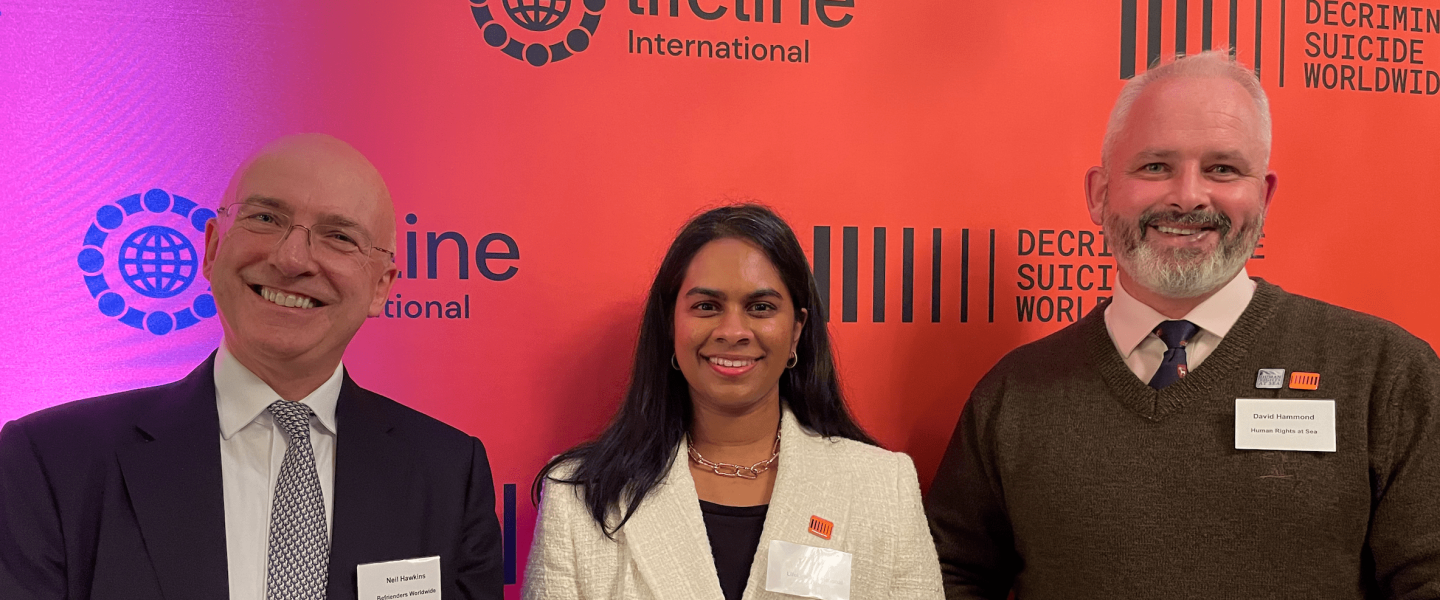Human Rights at Sea is proud to stand with Lifeline International in its critical campaign to decriminalise suicide worldwide.
This campaign launch, held at the heart of London in Australia House on Monday, October 23, brought together organisations and individuals dedicated to addressing this pressing global issue.
The statistics are both staggering and sobering: Every year, 700,000 lives are lost to suicide worldwide.
What's more, each of these tragic deaths ripples out, affecting an average of 60 more people. The consequences of these losses are far-reaching, impacting not only individuals but entire communities.
Adding to the challenge is the fact that suicide is still considered a crime in 25 countries, affecting approximately 1 billion people.
These legal barriers only serve to deepen the stigma associated with suicide, making it even more difficult for individuals to seek help when they need it most.
Alarmingly, there are approximately 850 million people without the simple option of picking up a phone and reaching out for support.
In the maritime industry, the full scope of the issue remains largely uncharted. We have recently drawn attention to the prevailing stigma and stark statistics concerning suicide, and this pressing concern was further highlighted in a recent article featured in Splash 24/7, shedding light on the urgent need for substantial intervention to address the distressing rates of suicide within the sector.
Fishers face unique challenges while at sea and are particularly vulnerable.
The Food and Agriculture Organization (FAO) estimated that the annual fatalities for fishing-related incidents claimed the lives of 32,000 people annually. However, in a more recent study by the FISH Safety Foundation, commissioned by The Pew Charitable Trusts, the data suggests that the problem far exceeds previous estimates, and the figure could be more than 100,000.
It is a global public health crisis not just on land but at sea, too.

With our focus to drive change on the water through increased awareness for those persons living, working and otherwise transiting at sea, HRAS is backing not just Lifeline but other organisations who bring this issue into the maritime environment, such as Befrienders Worldwide.
The approach put forth by Lifeline and its partners centres on compassion and understanding. It calls for shifting the focus from punishment to support, ensuring the right structures are in place to help those in need.
The aim is clear: to reduce the number of needless tragedies.
Lifeline has embarked on a mission to mobilise international action through an online media and social media campaign. They have also established a knowledge platform to provide the essential information needed to bring about legislative change.
This comprehensive effort is designed to address outdated and punitive laws, facilitating a compassionate and effective response to the global crisis of suicide.
Our charity is unwavering in its commitment to shine a spotlight on the critical issue of mental health for those living, working or transiting our world's seas and oceans, and we firmly believe that mental health is a human right, not a subject for criminalisation.
We will continue advocating for all individuals at sea, irrespective of their circumstances, to ensure the fundamental right to well-being and access to support and help when needed is achieved.
About Lifeline International: LifeLine International operates a network of over 200 LifeLine Centres through 27 Members in 23 countries, with a growing presence worldwide. The network comprises of 28 independent Member organisations that cover every region across high-, middle-, and low-income nations. LifeLine International and its Members collaborate to ensure that suicide prevention resources are available in more places with greater access and reduced barriers with the objective is to help more people worldwide with access to crisis support when they need it the most. international stakeholders on suicide prevention, crisis lines, and addressing the barriers of social stigma and ending the criminalisation of suicide.
Contact: If you have any questions, please write to us at enquiries@humanrightsatsea.org
About Sharing. We welcome the use and dissemination of our work with proper accreditation. Please ensure that our Terms of Use are conformed with at all times.
Please support Human Rights at Sea today by CLICKING HERE
Image: (L-R): Neil Hawkins (Befrienders Worldwide), Thilini Perera (CEO Lifeline International), David Hammond (CEO Human Rights at Sea)
Photo Credit: David Hammond, 2023
